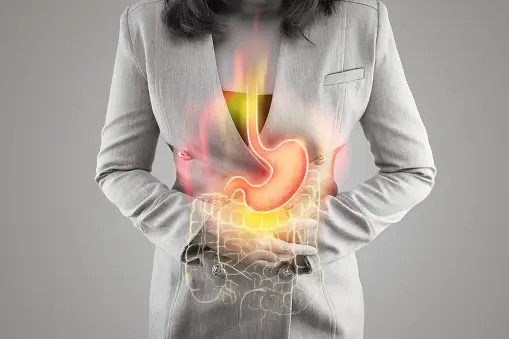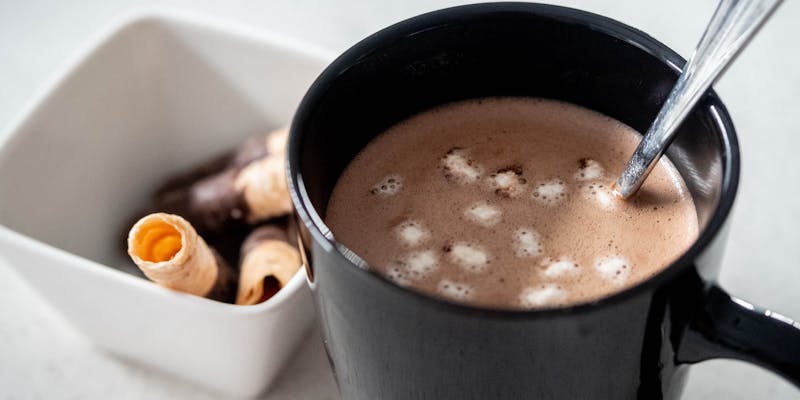Heartburn is an uncomfortable and often painful sensation in the chest or throat resulting from stomach acid pushing up your esophagus. It’s a common problem for millions of Americans, with nearly one-third experiencing heartburn at least once a month.
Experiencing this condition can mean you might be wondering – how long does heartburn last? The good news is that heartburn usually lasts only a few minutes to several hours, although there are also cases where symptoms can become long-lasting and even chronic.
In this blog post, we’ll look at what causes heartburn, why the length varies from person to person, and tips for reducing discomfort and managing any future episodes. Read on to learn more about understanding and treating your heartburn!
What is Heartburn, and Why Does it Occur?

Heartburn is a burning sensation when stomach acid flows into the esophagus. It is a common problem for many Americans and can cause various symptoms, including chest pain, nausea, a sour taste in the mouth, and even difficulty swallowing.
It’s important to understand why heartburn happens. Normally, food passes through your esophagus and into your stomach, where digestive enzymes break down the food.
At the same time, a valve called the lower esophageal sphincter (LES) opens and closes to keep acid in the stomach and out of the esophagus. However, acid can travel back into the esophagus if this valve doesn't close properly, causing heartburn.
How Long Does Heartburn Last?
Heartburn is usually a temporary issue lasting from a few minutes to several hours. However, there are cases where heartburn symptoms can persist and become chronic.
If you’re experiencing ongoing heartburn, it’s recommended that you talk to your doctor about possible treatments. Keeping a food diary can help you determine which foods might trigger your heartburn and adjust your diet accordingly.
Additionally, taking antacids or H2 blockers can help relieve heartburn symptoms.
Signs and Symptoms of Heartburn

Heartburn is a burning sensation in the chest or throat, usually after eating. Other symptoms may include an acidic taste in your mouth, burping, bloating or gassiness, and difficulty swallowing.
When these become chronic, meaning they occur more than twice a week for at least three consecutive weeks, it may be considered gastroesophageal reflux disease (GERD).
What Causes Heartburn?
The reflux of stomach acid causes heartburn in your esophagus. This happens when the lower esophageal sphincter (LES) muscle at the end of your esophagus fails to close properly.
As a result, stomach acid can travel back up, irritating the esophagus lining and causing a burning sensation.
How Long Does Heartburn Last?
The answer to this question is highly variable. The duration of heartburn can range from minutes to several hours after eating or drinking. It may even become chronic in some cases, meaning it happens more than twice a week for at least three weeks.
You may have GERD in these cases and should consider seeing your doctor to discuss treatment options.
When to See a Doctor
If you experience any of the following, seek medical attention: chest pain; difficulty swallowing; loss of appetite; weight loss; vomiting blood, or black stools.
Additionally, if your heartburn lasts more than a few minutes or occurs more than twice a week for at least three weeks, you should consult your doctor as it may indicate GERD and require treatment.
How to Manage the Symptoms of Heartburn?
Managing the symptoms of heartburn can be done in several ways. Eating a balanced diet low in fats and spices can help reduce the risk of developing heartburn.
Avoiding foods and drinks that trigger heartburn, such as acidic or spicy foods, caffeine, carbonated beverages, chocolate, and alcohol, can also help lessen its occurrence. Quitting smoking may also reduce symptoms.
Certain medications, such as antacids and H2 blockers, can help manage heartburn. However, it is important to consult your doctor before using medications or treatments to manage heartburn. In the case of chronic heartburn, lifestyle changes, and some medical treatments may be necessary.
These include medications that control acid production or reduce stomach irritation. Your doctor may also suggest that you undergo an endoscopy, which allows them to see inside the esophagus and stomach and look for signs of inflammation or other abnormalities that may be causing heartburn.
Common Treatments for Heartburn Relief
Once you’ve identified the cause of your heartburn, knowing some of the treatments available to help relieve your symptoms can be helpful.
There are many over-the-counter medications that you can take to help reduce the discomfort of heartburn and get it under control quickly. Antacids, H2 blockers, and PPIs are the most common types available.
These medications reduce stomach acid production or neutralize existing acids in your esophagus.
When to Seek Medical Attention For Heartburn?
Heartburn can be a bothersome but usually manageable issue. However, there are some cases where you should seek medical attention. If your symptoms last longer than three months and have not improved with lifestyle changes or over-the-counter medications, you must make an appointment with your healthcare provider.
It could indicate a more serious condition, such as gastroesophageal reflux disease (GERD). Medical attention should also be sought if you have trouble breathing, severe chest pain, or nausea.
Heartburn can sometimes be a sign of other diseases, such as hiatal hernia or peptic ulcer disease, and may need to be treated differently. A healthcare provider will take your medical history, conduct a physical exam and do some tests to understand better what is causing your heartburn.
Tips To Help Prevent Future Heartburn Outbreaks
The good news is that you can take some simple steps to reduce your risk of experiencing long-term and chronic heartburn. Here are a few tips to help prevent future outbreaks:
1. Avoid trigger foods. Certain foods and drinks, such as citrus fruits, tomato sauce, coffee, alcohol, spicy dishes, and greasy or fatty foods, can all cause heartburn. Try to avoid these foods or eat them in moderation.
2. Don’t overeat. Eating large meals can put more pressure on your stomach and lead to stomach acid reflux in your esophagus, contributing to heartburn symptoms. Try to eat smaller meals more frequently throughout the day instead.
3. Don’t lie down after eating. When you eat, the food must go through your digestive system before you can lie down again. Lying down too soon afterward increases your risk of experiencing heartburn.
4. Elevate your head when sleeping. Propping up your head and upper body during sleep can help reduce acid reflux symptoms at night.
5. Quit smoking. Smoking can worsen acid reflux and heartburn symptoms, as it increases the production of stomach acid.
- Wear loose-fitting clothing. Tight or restrictive clothing can pressure your abdomen, increasing stomach acid reflux into your esophagus and causing heartburn symptoms to flare up.
FAQs
Can heartburn last for days?
In some cases, heartburn can last for days or even weeks. This is usually the result of underlying conditions such as GERD (gastroesophageal reflux disease), where stomach acid regularly backs up into the esophagus. In these cases, it’s important to seek medical advice from a healthcare professional to properly treat and manage heartburn symptoms.
What causes heartburn?
Heartburn is caused by stomach acid pushing into the esophagus, often due to certain foods or beverages consumed. Common triggers include fried food, citrus fruits and juices, spicy dishes, tomato-based sauces, alcohol, caffeine, chocolate, and peppermint. Some medications can also cause heartburn, such as aspirin and ibuprofen.
Will heartburn go away on its own?
Sometimes, heartburn can go away on its own if you avoid certain trigger foods and beverages. However, if the symptoms persist or worsen, seeking medical advice is important to properly treat and manage the heartburn.
Conclusion
When it comes to answering the question – how long does heartburn last? – the answer varies. Symptoms can either be short-term, lasting for just a few minutes to several hours, or they can become chronic and long-lasting.
If you’re concerned about long-lasting heartburn, consult your doctor for advice and potential treatment options.







